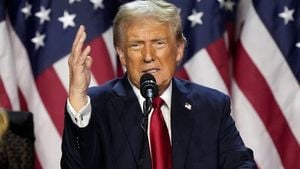With the unexpected return of former President Donald Trump to the White House, many institutions of higher learning are bracing for potential changes and challenges. For numerous campuses across the United States, Trump’s victory is illuminating long-held concerns about the political climate’s effect on academic freedom and institutional integrity.
The Harvard Crimson recently published an editorial addressing the significant unease felt by students and faculty alike. A shift in leadership often breeds uncertainty, but this time it feels even more pronounced. The editorial reflects on the palpable anxiety at Harvard, where professors announced class cancellations, and students engaged in long, solemn embraces, sharing their fears about what lies ahead under Trump's administration.
The return of Trump is not merely seen as the reinstatement of past policies; it presents the prospect of more aggressive measures against institutions perceived as adversaries. Students at Swarthmore University, for example, have voiced their apprehension about Trump’s agenda potentially dismantling progressive gains shaped over the past few years. They explicitly noted worries about heightened deportation efforts and threats to federal educational support, particularly for marginalized groups.
Under the Trump administration, the Department of Education had previously implemented aggressive tax policies affecting university endowments. One notable change was the introduction of taxation on endowments, historically exempt from such federal scrutiny. Reports indicate Trump’s former Vice President contributed to this atmosphere by labeling educational institutions as “enemies,” setting the stage for greater fiscal challenges.
Specifically, Trump's Project 2025 outlines ambitious reforms to abolish the Department of Education altogether. Such proposals, culled from the policy frameworks authored by former Trump administration officials, have raised alarms throughout the academic world. Several institutions are already feeling the pinch of increased political oversight and scrutiny, as seen with congressional investigations focused on their funding and practices.
Institutions like Harvard have taken firm stances against past Trump policies, including filing amicus briefs challenging his administration's restriction on immigration from Muslim-majority countries and advocating for diverse admissions practices. This spirit of resistance, whilst commendable, carries with it the weight of potential backlash, especially with the Supreme Court now populated by Trump appointees.
Within this tumultuous backdrop, the need for universities to uphold their missions of fostering free inquiry has never been more pressing. While many have begun crafting institutional policies aimed at safeguarding free speech on campus, critics argue these often come as half-measures against pressing political realities.
Editorial boards from several major universities, including The Harvard Crimson, have urged their administrations to reevaluate their positions. They argue the need to address fundamental principles of free speech and academic freedom is increasingly urgent. These editorial voices resonate with students who have noted the risks posed by the Trump administration’s recent moves to label educational institutions as hubs of “wokeness.”
At the core of the current discourse lies the specter of past promises made by Trump: proposals to abolish protections for LGBTQ+ rights, stricter immigrant policies, and the rollback of reproductive rights. College students increasingly feel at the forefront of these debates, sparking discussions about what activism ought to look like under such hostile conditions.
Looking to future leadership appointments under Trump, names of individuals who previously served during his presidency and displayed controversial stances toward higher education are coming to light as potential candidates for key roles, including Secretary of Education. The potential choices carry significant weight not only for national educational policies but also for the autonomy of universities as they navigate funding and accreditation pressures.
On the ground, colleges face the challenge of balancing their commitment to free expression with the chilling climate of anxiety instigated by political dimensions. Reporting from AOL News highlights the sweeping actions being taken by the Department of Education to address antisemitism and discrimination on campuses by launching numerous investigations. The investigations sometimes tread dangerously close to infringing on students’ rights to protest and express their beliefs. Doing so raises red flags about how institutions interpret freedom of speech when national sentiments shift dramatically.
Mitigated by fears of losing federal funding or facing more stringent scrutiny, colleges are curbing student speech, confusing compliance with commitment to academic values. This may only push the issues underground rather than resolving them, creating environments ripe for frustration and potentially explosive pushback.
For many institutions, the route forward is not merely about resisting Swift and furious challenges from federal entities but also about promoting shared human experiences within their communities. Various campus groups have sought to combat isolation by fostering dialogues among students, faculty, and administrators, focusing on common aims rather than apprehensions. These initiatives, though fledgling, present potential pathways for resilience.
With students increasingly engaged politically, it’s becoming evident the next few years will demand bold responses from higher education institutions. Engaging students, faculty, and alumni through positive campaigns highlighting the social good derived from these institutions could reshape narratives currently overshadowed by skepticism and hostile rhetoric.
This call for transparency and active participation resonates with many who believe universities should not retreat from vocally supporting their student body’s diverse needs. While challenges loom large, there’s potential for universities to emerge not only as sanctuaries of learning but also as bastions of democratic practice and civil discourse. Challenging narratives surrounding education is centrist to this idea, signaling institutions need to take the lead—garnering support for their missions from within rather than solely defending against threats from outside forces.
So as we look to the future, what remains clear is this: higher education needs to find its voice and engage authentically with the political elements impacting its constituency. It’s time for institutions to embrace their strength and wrestle with the multiple meanings of academic freedom, especially now, at this transformative junction, where voices of dissent and advocacy can shape the fabric of education as we know it.



